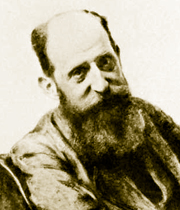|
The Cathartic Therapy
By Jean Chiriac
People that have endless trust in the creative capacity of a genius are undoubtedly wrong. What is truly brilliant in the personality of
exceptional people is their gift for synthesis - in the case of creators - and their art to allow themselves to be favored by fellows and times - in the case of politicians. Freud seems to have merged both gifts.
Dr. Breuer, one of the most influential scientists and physicians of his time, was a close relation of Freud, a support and the originator
of cathartic procedure |
But the most important influence on the emergence of psychoanalysis belonged to the experiments
Dr. Joseph Breuer in Vienna conducted with a young hysterical woman, whose clinical name was Anna O. Otherwise a renowned doctor of the time, Dr. Breuer was the first to realize that symptoms of hysteria completely disappeared when, under hypnosis, the patient would recall and at the same time relive emotional circumstances bringing about the symptoms. It was thus that cathartic therapy was born.Having collaborated with Dr. Breuer for a while, Freud himself acknowledges the later's influence on the emergence of psychoanalysis. On his first conference at Clark University of the United States in September 1909, Freud would modestly declare:
In the year 1909, when I was first privileged to speak publicly on psychoanalysis in an American University, fired by this momentous occasion for my endeavors, I declared that it was not myself who brought psychoanalysis into existence. I said that it was Joseph Breuer, who had merited this honor at a time when I was a student and busy working for my examinations (1880-1882). Since then, well-intentioned friends have frequently repeated that I then expressed my gratitude out of all due proportion. They considered that, as on previous occasions, I should have dignified Breuer's "cathartic procedure" as merely preliminary to psychoanalysis, and should have claimed that psychoanalysis itself only began with my rejection of the hypnotic technique and my introduction of free association.
Now it is really a matter of indifference whether the history of psychoanalysis be considered to have started with the cathartic method or only with my modification of the same. I only enter into this uninteresting question because some opponents of psychoanalysis are wont to recall, now and then, that the art of psychoanalysis did not originate with me at all, but with Breuer. Naturally, this only happens to be the case when their attitude permits them to find in psychoanalysis something that is noteworthy; on the other hand when their repudiation of psychoanalysis is unlimited, then psychoanalysis is always indisputably my creation. I have never yet heard that Breuer's great part in psychoanalysis has brought him an equal measure of insult and reproach.
As I have recognized long since that it is the inevitable fate of psychoanalysis to arouse opposition and to embitter people, I have come to the conclusion that I must surely be the originator of all that characterizes psychoanalysis. I add, with satisfaction, that none of the attempts to belittle my share in this much disdained psychoanalysis has ever come from Breuer himself, or could boast of his support.
(Translation by A.A.Brill, 1917).Many people's view of Freud's acknowledgment was that it expressed his modesty, just as I previously suggested myself;
in other words, Freud's confirmation that Breuer was in fact the founder of psychoanalysis was just giving the later what he deserves. Nevertheless, in 1909, psychoanalysis was not yet what it was
to become later on, when the practice of Such as certain authors also previously remarked, the more
probable thing is that Freud's alleged modesty was in fact the cover for some simple reckoning: indicating Breuer as the creator of psychoanalysis meant transferring the charge
("blame") of its emergence to someone else and not to just any person, as Breuer was an already well-known figure in the field of medical science.
<=
Back to the History Sectionor to the
Home PageCopyright 2002-2025, AROPA. All rights reserved.
